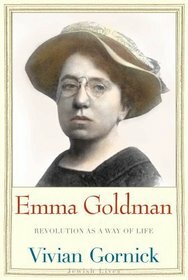The Most Dangerous Woman in America
By Sephora Markson Hartz
The name Emma Goldman has long garnered strong reactions. After all, J. Edgar Hoover called her "the most dangerous woman in America." But that's understandable, considering Goldman herself unapologetically crusaded against centralized government, gender inequality, and labor rights violations. An anarchist, agitator, and advocate of free love, in the early 20th century Goldman was an American celebrity of the radical left.
Which makes it all the more surprising that her most recent biographer, writer and feminist Vivian Gornick, claims that she's actually not all that taken with Goldman. Part of her ambivalence may derive from the fact that Goldman wasn't actually Gornick's first choice of subject, as she explained November 29 at a "Tenement Talk" at the Lower East Side's Tenement Museum. Gornick's book, Emma Goldman: Revolution as a Way of Life, was recently published as part of Yale University Press's "Jewish Lives" series, and when Gornick was approached about contributing, her initial request was to write about Rosa Luxemburg.
In the end, though, Gornick consented to writing about Goldman ("I didn't want to give the money back!"), and found that despite Goldman's off-putting grandiosity and uncompromising commitment to ideology, her ultimate goal was calling attention to the suffering of the underclass. And that, apparently, is a notion Gornick could get behind. Goldman understood, Gornick explained, "that things need not be as they are," and had a gift for conveying "what it feels like to be on the other side of [intolerable] conditions."
Like Gornick's feelings about her, Emma Goldman's legacy is complicated. When she died in 1940, Goldman left a great deal of work undone and a trail of disappointments: The Left had lost the Spanish Civil War in 1939; both the United States and the U.S.S.R. had cast her into exile, the latter leaving her bitterly disillusioned; and the supposed love of her life—"The Hobo Doctor" Ben Reitman—was compulsively unfaithful to her. Yet her radical spirit has endured, and still serves as an inspiration to others. As Gornick recalled, at a recent Occupy Wall Street protest a young woman stood up, donning Goldman's signature spectacles, and cried: "I'm Emma Goldman and I've traveled through time to tell you: I love what you're doing!"
Love her, hate her, or feel something in between, Emma Goldman is still a force to be reckoned with—just as J. Edgar Hoover claimed.
Sephora Markson Hartz is the Assistant Editor for Secular Culture & Ideas. She received her Master’s of Theological Studies in Jewish Studies from Harvard Divinity School (’10), and a Bachelor of Arts from University of California, Berkeley, in Religious Studies, with an area of emphasis in Jewish Studies (‘07).
Watch complete video footage of Vivian Gornick's Tenement Talk at the Tenement Museum
|




